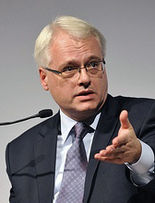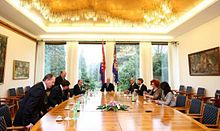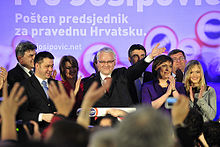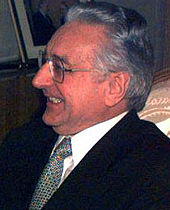- President of Croatia
-
President of
the Republic of Croatia
Predsjednik Republike Hrvatske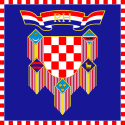
Presidential StandardResidence Predsjednički dvori Term length Five years, renewable once Inaugural holder Franjo Tuđman Formation December 22, 1990 Salary 23,500 kuna /month Website www.predsjednik.hr Croatia 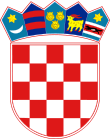
This article is part of the series:
Politics and government of
CroatiaConstitutionJudiciaryExecutive- President (List)
- Ivo Josipović
- Government (List)
- Prime Minister
- Jadranka Kosor
- Cabinet
- Prime Minister
- Croatian Democratic Union (HDZ)
- Social Democratic Party (SDP)
- Croatian People's Party -
Liberal Democrats (HNS-LD) - Croatian Peasant Party (HSS)
- Istrian Democratic Assembly (IDS)
- Croatian Democratic Alliance
of Slavonia and Baranja (HDSSB) - Croatian Social Liberal Party (HSLS)
- Croatian Party of Pensioners (HSU)
- Croatian Party of Rights (HSP)
Divisions
The President of Croatia (Croatian: Predsjednik Hrvatske), officially styled the President of the Republic (Croatian: Predsjednik Republike) represents the Republic of Croatia in the country and abroad as the head of state, maintains regular and coordinated operation and stability of the national government system and safeguards independence and territorial integrity of the country. The president calls elections for the Parliament of Croatia (Croatian: Hrvatski Sabor) as well as referenda. The president also appoints prime ministers, on the basis of balance of power in the parliament, grants pardons and awards decorations and other forms of state awards. The President of Croatia and the government cooperate in area of Croatian foreign policy, and the president is the commander-in-chief of the Croatian Armed forces while directing operation of the Croatian security and intelligence system jointly with the government. The president may dissolve the parliament as provided by the constitution. Although enjoying immunity, the president is impeachable for any violation of the constitution. In case of incapacitation to discharge duties of the office, the Speaker of the parliament assumes office of acting president until the president resumes the duty or until a new election and inauguration of the president. The inauguration ceremony is held at St. Mark's Square in Zagreb, in front of the St. Mark's Church, halfway between the parliament and Banski dvori—seat of the government.
The Office of the President of the Republic (Croatian: Ured Predsjednika Republike) consists of the immediate staff of the president of Croatia, as well as support staff reporting to the president, and it was established by a presidential decree by Franjo Tuđman on 19 January 1991. The office employs advisors to the president and comprises eight departments, four councils, presidential pardon commission and two decorations and awards commissions. The office is headquartered in the Presidential Palace (Croatian: Predsjednički dvori) in Pantovčak are of Zagreb.
The president is elected on the basis of universal suffrage through a secret ballot for a five year term. If no candidate in the elections secures more than 50% of the votes, a runoff election is held in 14 days. The Constitution of Croatia sets limit to the maximum two terms in the office and requires elections date to be determined within 30 to 60 days before expiry of term of the incumbent president and the president-elect is required to take an oath of office before the judges of the Constitutional Court. Franjo Tuđman won the first Croatian presidential elections in 1992 and 1997. During his reign, the constitution of 1990 provided for a semi-presidential system. After his death in 1999, the constitution was amended and much of the presidential powers were transferred to the parliament and the government. Stjepan Mesić won two consecutive terms, in 2000 on Croatian People's Party (HNS) ticket and in 2005, the maximum permitted by the constitution. Ivo Josipović, an SDP candidate, won the presidential elections held in December 2009 and January 2010.
The Constitution of Croatia defines appearance and use of the presidential standard as a symbol of the President of Croatia, and appearance and use of the presidential sash as a symbol of honour of the office of the president. The presidential standard is flown on buildings of the Office of the President of Croatia, residence of the president and transportation vehicles when in use by the president, and in other ceremonial occasions. The constitution specifies that the sash is worn on the Statehood Day, during awards ceremonies, during acceptance of letters of credence and in other ceremonial occasions, however the presidential sash was not in use since 2000 inauguration of Stjepan Mesić.
Contents
Powers, duties and responsibilities
See also: Constitution of Croatia and Politics of CroatiaThe President of Croatia, officially styled the President of the Republic (Croatian: Predsjednik Republike) represents the Republic of Croatia in the country and abroad as the head of state, maintains regular and coordinated operation and stability of the national government system and safeguards independence and territorial integrity of the country. The president is barred from executing any other public or professional duty while in office.[1]
The President of Croatia calls elections for the Parliament of Croatia (Croatian: Hrvatski Sabor) and convenes the first meeting of the parliamentary assembly. The president is also required to appoint a prime minister, on the basis of balance of power in the parliament. The appointed candidate is in turn required to seek confirmation of the parliament through a confidence vote to receive a mandate to lead the Government of Croatia. The president may also call referenda, grant pardons and award decorations and other forms of recognition defined by legislation.[1]
Foreign affairs
See also: Foreign relations of CroatiaThe President of Croatia and the Government cooperate in formulation and implementation of Croatian foreign policy. This provision of the constitution is occasional source of conflict between the president and the government.[2] The president decides on the establishment of diplomatic missions and consular offices of the Republic of Croatia abroad, at the Government's proposal and with the counter-signature of the Prime Minister. The president, following prior counter-signature of the Prime Minister, appoints and recalls diplomatic representatives of the Republic of Croatia, at the proposal the Government and upon receiving opinion of an applicable committee of the parliament. The president receives letters of credence and the letters of recall from foreign diplomatic representatives.[1]
National security and defense
See also: Military of Croatia and Croatian security and intelligence systemThe President of Croatia is the commander-in-chief of the Armed forces of the Republic of Croatia and appoints and relieves of duty military commanders, conforming to applicable legislation. Pursuant to decisions of the parliament, the president declares war and concludes peace. In cases of immediate threats to the independence, unity and existence of the state, the president may order use of the armed forces even if no state of war is declared, provided that such an order is countersigned by the prime minister. During a state of war the president may promulgate regulations with the force of law on the basis of, and within the scope of, authority obtained from the parliament. In such circumstances, the president may convene government cabinet meetings and preside over them. If the parliament is not in session, the president is authorized to regulate all matters required by the state of war through regulations carrying the force of law. In case of an immediate threat to the independence, unity and existence of the state, or if the governmental bodies are prevented from performing their constitutional duties regularly, the president may, at the proposal of the prime minister, issue regulations carrying the force of law. Such regulations also have to be countersigned by the prime minister to become valid. The president is required to submit thus promulgated regulations to the parliament for approval as soon as the parliament may convene, otherwise the regulations become void. The president cooperates with the government directing operation of the Croatian security and intelligence system. The president and the prime minister jointly appoint heads of the security agencies, and the president may attend cabinet meetings, taking part in discussions held at such meetings.[1]
Dissolution of Parliament
See also: Parliament of CroatiaThe President of Croatia may dissolve the parliament upon request of the government. That decision must be countersigned by the prime minister to become valid. The president may also dissolve the parliament after a motion of no confidence supported by majority of the parliament members, or if the parliament fails to approve the government budget within 120 days after the budget is proposed in the parliament. However, the president may not dissolve the parliament at request of the government if a procedure to determine if the president has violated provisions of the constitution is in progress.[1]
Office of the President of Croatia
Main article: Office of the President of CroatiaThe Office of the President of the Republic (Croatian: Ured Predsjednika Republike) consists of the immediate staff of the President of Croatia, as well as support staff reporting to the president. As of May 2008, the office employed 170 staff with the maximum staffing level set at 191 by the Regulation on Internal Organisation of the Office of the President of Croatia.[3] In 2009 government budget, the office was allocated 54 million kuna (c. 7.3 million euro).[4] Net monthly salary of the president is 23,500 kuna (c. 3,170 euro).[5][6]
The Office of the President was created by a presidential decree by Franjo Tuđman on January 19, 1991.[7] The Office is headed by a Chief of Staff (Croatian: Predstojnik ureda), who is appointed by the president. As of November 2011, no Office of the President of the Republic Act has been enacted, even though the constitution requires so. Instead, the presidents declare bylaws regulating composition of the office.[8] The office employs advisors to the president and comprises eight departments, four councils, presidential pardon commission and two decorations and awards commissions.[9] Since February 2010, Joško Klisović is the chief of staff.[10]
Office of the President of the Republic of Croatia[9] Position Name Chief of Staff Joško Klisović Head of the Personal Office of the President Danica Juričić Spasović Assistant Head of the Personal Office of the President Ana Šimundža Secretary of the Office of the President of the Republic Mirjam Katulić Departments of the Office of the President of the Republic of Croatia[11] Department Head Military Affaris Major General Krešimir Kašpar Protocol of the President of the Republic Petra Furdek Press and Information Department Danja Šilović Karić Legal Affairs and Human Resources Jasna Prka Department for Computerization Zdravko Galić Decoration and Awards Department Colonel Mirko Marjan Department for Relations with Citizens Sandra Krvavica Department for Technical and Auxiliary Services Milodrag Pralas Councils of the Office of the President of the Republic of Croatia Council Head Tasks Foreign Policy and International Relations Council Budimir Lončar Analysis of foreign policy issues[12] Social Justice Council Dušanka Marinković-Drača Analysis of human rights, labour and social issues and of achievement of social responsibility[13] War Veterans Council Petar Stipetić Analysis of issues related to Croatian War of Independence and World War II veterans and their families[14] Economy Council Prof. Boris Cota, PhD Counseling the President of Croatia on current economic issues[15] Commissions of the Office of the President of the Republic of Croatia Commission Head Tasks Presidential Pardon Commission Prof. Vladimir Ljubanović, PhD Issuing presidential pardons[16] Civilian Decorations and Awards Commission Academician Milan Moguš Awarding civilian decorations and awards[17] Military Decorations and Awards Commission Imra Agotić Awarding military decorations and awards[18] Presidential Palace
Main article: Presidential Palace, ZagrebThe Presidential Palace (Croatian: Predsjednički dvori, also referred to by the metonym Pantovčak) in Zagreb is the official residence of the president. The president does not actually live in the building as it is used to house the Office of the President of Croatia rather than as a residence. The structure covers 3,700 square metres (40,000 square feet). It is used as the official residence since then president Franjo Tuđman moved there following October 1991 bombing of Banski dvori. In addition to the original building, there is also a 3,500 square metres (38,000 square feet) annex built in 1993, an ancillary structure housing office security services and bomb shelter predating the 1990s.[4] The building, formerly known as Villa Zagorje or Tito's Villa, was designed by architects Vjenceslav Richter and Kazimir Ostrogović and completed in 1964 for the former Yugoslav president Josip Broz Tito.[19][4]
Election and taking office
Presidential inaugurations President Date Note Franjo Tuđman 12 August 1992 first term[20] 5 August 1997 second term[21] Stjepan Mesić 18 February 2000 first term[22] 18 February 2005 second term[23] Ivo Josipović 18 February 2010 incumbent, first term[24] See also: Elections in CroatiaThe president is elected on the basis of universal suffrage through a secret ballot for a five year term. If no candidate in the elections secures more than 50% of the votes, a runoff election is held in 14 days. The Constitution of Croatia sets limit to the maximum two terms in the office and requires elections date to be determined within 30 to 60 days before expiry of term of the incumbent president.[1]
The constitution requires that the president-elect resigns from political party membership.[1] The president-elect is also required to resign from the parliament as well.[25] Before assuming the presidential duty, the president-elect is required to take an oath of office before the judges of the Constitutional Court, swearing loyalty to the Constitution of Croatia. The inauguration ceremony is traditionally held at St. Mark's Square in Zagreb, in front of the St. Mark's Church, midway between the building of the Parliament of Croatia and Banski dvori—seat of the Government of Croatia.[24] Text of the oath is defined by the Presidential Elections Act amendments of 1997.[26]
Presidential elections
Presidential elections were held in Croatia for the first time on 2 August 1992 simultaneously with the 1992 parliamentary elections. Voter turnout was 74.9%. The result was a victory for Franjo Tuđman of the Croatian Democratic Union (HDZ), who received 57.8% of the vote in the first round of the elections, ahead of 7 other candidates. Dražen Budiša, the Croatian Social Liberal Party (HSLS) candidate and runner-up in the election, received 22.3% of the vote. The second presidential elections in modern Croatia were held on 15 June 1997. The incumbent, Franjo Tuđman ran opposed by Zdravko Tomac, candidate of the Social Democratic Party of Croatia (SDP) and Vlado Gotovac, nominated by the HSLS. Tomac and Gotovac received 21.0% and 17.6% of votes respectively in the first round of voting, and Tuđman secured another term. The third presidential elections were held on 24 January 2000, to fill the office of the President of the Republic, after the incumbent Franjo Tuđman died on 10 December 1999.[27] The first round of voting saw Stjepan Mesić, candidate of the Croatian People's Party (HNS) in front, receiving 41.3% of votes, followed by Dražen Budiša of the HSLS with 27.8% of votes and Mate Granić nominated by the HDZ receiving 22.6% of votes. The runoff election, the first in the presidential elections in modern Croatia, was held on 7 February, when Mesić won picking up 56.9% of votes. Voter turnout in the first round was 63.0% and 60.9% in the runoff.[28] The first round of the fourth presidential elections was held on 2 January 2005. No candidate secured a first-round victory, however incumbent Mesić enjoyed substantial lead over other candidates as he received 48.9% of votes and the second and third ranked candidates Jadranka Kosor (HDZ) and Boris Mikšić (independent) managed only 20.3% and 17.8% voter support respectively. Ultimately, Mesić won reelection as he received 65.9% of votes in the runoff held on 16 January. The [[last Croatian presidential election was held on 27 December 2009, with Ivo Josipović (SDP) picking up 32.4% of votes, followed by Milan Bandić (independent), Andrija Hebrang (HDZ) and Nadan Vidošević (independent) receiving 14.8%, 12.0% and 11.3% of the votes respectively. The second round of voting was held on 10 January 2010, when Josipović defeated Bandić as he received 60.3% of votes.[29]
Election Candidates First round
voter turnoutFirst round results
(candidates with more than 10% of votes)Second round
voter turnoutWinner 1992 8 74.90% Franjo Tuđman (57.8%), Dražen Budiša (22.3%) N/A Franjo Tuđman 1997 3 54.62% Franjo Tuđman (61.4%), Zdravko Tomac (21.0%), Vlado Gotovac (17.6%) N/A Franjo Tuđman 2000 9 62.98% Stjepan Mesić (41.3%), Dražen Budiša (27.8%), Mate Granić (22.6%) 60.88% Stjepan Mesić 2005 13 50.57% Stjepan Mesić (48.9%), Jadranka Kosor (20.3%), Boris Mikšić (17.8%) 51.04% Stjepan Mesić 2009-2010 12 43.96% Ivo Josipović (32.4%), Milan Bandić (14.8%),
Andrija Hebrang (12.04%), Nadan Vidošević (11.33%)50.13% Ivo Josipović Source: State Election Commission[29] Immunity and impeachment
The President of Croatia enjoys immunity—the president may not be arrested nor can any criminal proceedings may be instituted against the president without prior consent of the Constitutional Court. The immunity does not apply only if the president has been caught in the act of committing a criminal offense which carries a penalty of imprisonment of more than five years. In such a case the state body which has detained the president must notify the President of the Constitutional Court immediately.[1]
The President of Croatia is impeachable for any violation of the Constitution committed in performance of duties. Impeachment proceedings may be initiated by the Parliament of Croatia by a two-thirds majority vote of all members of the parliament. The impeachment of the president is then decided by the Constitutional Court by a two-thirds majority vote of all its judges. If the Constitutional Court impeaches the president, the president's term is terminated.[1]
Temporary incapacitation and termination of term
In case of brief incapacitation to execute the office of the President of Croatia due to absence, illness or vacations, the president may transfer powers to the Speaker of the Parliament of Croatia to act as a deputy. The president decides on revocation of the authority and return to the office. If the president is prevented from performing his duties for a longer period of time due to illness or other form of incapacitation, and especially if the president is unable to decide on a transfer of the powers to a deputy, the Speaker of the parliament becomes an acting president, assuming the presidential duty pursuant to a decision of the Constitutional Court, made upon request of the Government.[1]
In case of death or resignation submitted to the President of the Constitutional Court and communicated to the Speaker of the parliament, or in cases when the Constitutional Court decides to terminate of the presidential term through impeachment, the Speaker of the parliament becomes acting president. In those circumstances, new legislation is countersigned by the Prime Minister instead of the president and a new presidential election must be held within 60 days.[1] This situation occurred after the death of Franjo Tuđman on 10 December 1999,[30] when Vlatko Pavletić became the acting president.[31] After the parliamentary elections of 2000, the role was transferred to Zlatko Tomčić, who filled the office until Stjepan Mesić was elected President of Croatia in 2000.[32]
Speakers of the parliament as acting presidents of Croatia Name Assumed office Left office Notes Party Vlatko Pavletić 10 December 1999 2 February 2000 Office expired when the 3rd Sabor was replaced by the 4th[31] HDZ Zlatko Tomčić 2 February 2000 18 February 2000 Replaced Pavletić after the 4th Sabor convened[32] HSS Symbols
See also: Flag of CroatiaLegislation defines appearance and use of the Presidential Standard of Croatia as a symbol of the President of Croatia, and appearance and use of the presidential sash as a symbol of honour of the office of the president. The presidential standard is square, blue field with a thin border of alternating red and white squares—29 on each side. In the centre of the blue field there is the main shield of the coat of arms of Croatia with historical arms of Croatia surrounding the main shield. From left to right those are the oldest known coat of arms of Croatia and arms of Republic of Dubrovnik, Dalmatia, Istria and Slavonia, adorned with bands of gold, red and white stripes extending down vertically. Atop the shield there is a Croatian tricolour ribbon with golden letters RH standing for the Republic of Croatia, executed in Roman square capitals. The presidential standard is flown on buildings of the Office of the President of Croatia, residence of the president and transportation vehicles when in use by the president, and in other ceremonial occasions.[33] The presidential standard was designed by Miroslav Šutej in 1990.[34]
The presidential sash is Croatian tricolour band trimmed with gold and adorned with the coat of arms of Croatia placed in the white field of the tricolour at the front. The arms are bordered by oak branches on its left and olive branches on its right. The sash is worn diagonally, over the right shoulder and is fastened using a square clasp trimmed with golden Croatian interlace and adorned with the arms used on the presidential standard, although without the ribbon used in the arms. The constitution specifies that the sash is worn on the Statehood Day, during awards ceremonies, during acceptance of letters of credence and in other ceremonial occasions.[33] The presidential sash was not in use since 2000 inauguration of Stjepan Mesić.[35]
History
The Socialist Republic of Croatia within SFR Yugoslavia was led by a group of communist party functionaries who formed a collective Presidency with the president of the Presidency at its head. The first democratic elections of 1990 did not elect members of the Presidency directly. Rather, the parliament was tasked with filling these positions as it had done in the socialist period. The Croatian Democratic Union won the elections and its leader Franjo Tuđman assumed the presidency of the Presidency on May 30, 1990. On July 25, the parliament passed several constitutional amendments, including amendment LXXI which created the position of President and of Vice-Presidents.[36] The Christmas Constitution passed on December 22, 1990 established the government as a semi-presidential system and called for presidential elections.[37]
Tuđman won presidential elections in 1992 and 1997. During his reign, Constitution of Croatia adopted in 1990 provided for a semi-presidential system.[37] After his death in 1999, the constitution was amended and much of the presidential powers were transferred to the parliament and the government.[38] Stjepan Mesić won two consecutive terms, in 2000 on Croatian People's Party (HNS) ticket and in 2005, the maximum permitted by the constitution. Ivo Josipović, an SDP candidate, won the presidential elections held in December 2009 and January 2010.[29]
See also
- Politics of Croatia
- List of Presidents of Croatia
- Office of the President of Croatia
- Prime Minister of Croatia
References
- ^ a b c d e f g h i j k "Ustav Republike Hrvatske [Constitution of the Republic of Croatia]" (in Croatian). Narodne Novine. 9 July 2010. http://narodne-novine.nn.hr/clanci/sluzbeni/2010_07_85_2422.html. Retrieved 11 October 2011.
- ^ Nikola Sever Šeni (17 April 2010). "Josipović: Neka me premijerka Kosor opozove ili neka odstupi! [Josipović: Prime Minister Kosor should impeach me or step down]" (in Croatian). Večernji list. http://www.vecernji.hr/vijesti/josipovic-neka-me-premijerka-kosor-opozove-ili-neka-odstupi-clanak-127439. Retrieved 20 November 2011.
- ^ "Plan prijama u državnu službu u Ured predsjednika Republike Hrvatske za 2008. godinu [Civil Service Hiring Plan for the Office of the President of the Republic of Croatia for Year 2008]" (in Croatian). Narodne Novine. 5 May 2008. http://narodne-novine.nn.hr/clanci/sluzbeni/2008_05_51_1712.html.
- ^ a b c Vanja Nezirović (25 August 2009). "'Ne dolazi u obzir da se odreknemo Pantovčaka' ["Giving up Pantovčak is out of the question"]" (in Croatian). Jutarnji list. http://www.jutarnji.hr/-ne-dolazi-u-obzir-da-se-odreknemo-pantovcaka-/307483/. Retrieved 19 November 2011.
- ^ Dražen Boroš (10 September 2010). "S mjesečnom plaćom od 20 tisuća kuna "brinu" za socijalnu pravdu ["Care" for social justice with 20 thousand kuna monthly salary]" (in Croatian). Glas Slavonije. http://www.glas-slavonije.hr/vijest.asp?rub=1&ID_VIJESTI=129923. Retrieved 20 November 2011.
- ^ "Imovinske kartice:Josipovićev predstojnik Ureda ima plaću kao ministar [Property declarations:Josipović Chief of Staff is paid as a minister]" (in Croatian). index.hr. 2 April 2010. http://www.index.hr/vijesti/clanak/imovinske-kartice-josipovicev-predstojnik-ureda-ima-placu-kao-ministar-/484123.aspx. Retrieved 20 November 2011.
- ^ "Odluka o osnivanju Ureda Predsjednika Republike [Decision on Establishment of the Office of the President of the Republic]" (in Croatian). Narodne novine. 11 February 1991. http://narodne-novine.nn.hr/clanci/sluzbeni/1991_02_5_105.html. Retrieved 19 November 2011.
- ^ Silvana Perica (12 May 2010). "Ustavni sud: Sabor mora donijeti zakon o Uredu predsjednika [Constitutional court: The Sabor Must Enact the Office of the President Act]". Večernji list. http://www.vecernji.hr/vijesti/ustavni-sud-sabor-mora-donijeti-zakon-uredu-predsjednika-clanak-139344. Retrieved 19 November 2011.
- ^ a b "Office of the President". Office of the President of Croatia. http://www.predsjednik.hr/OFFICEOFTHE. Retrieved 19 November 2011.
- ^ "Joško Klisović" (in Croatian). Office of the President of Croatia. http://www.predsjednik.hr/CV_Josko_Klisovic. Retrieved 19 November 2011.
- ^ "Odjeli [Departments]". Office of the President of Croatia. http://www.predsjednik.hr/Departments. Retrieved 19 November 2011.
- ^ "Savjet za vanjsku politiku i međunarodne odnose [Foreign Policy and International Relations Council]". Office of the President of Croatia. http://www.predsjednik.hr/SavjetZaVanjsku. Retrieved 19 November 2011.
- ^ "Vijeće za socijalnu pravdu [Social Justice Council]". Office of the President of Croatia. http://www.predsjednik.hr/SavjetZaSocijalnu. Retrieved 19 November 2011.
- ^ "Savjet za ratne veterane [War Veterans Council]". Office of the President of Croatia. http://www.predsjednik.hr/SavjetZaRatne. Retrieved 19 November 2011.
- ^ "Savjet za gospodarstvo [Economy Council]". Office of the President of Croatia. http://www.predsjednik.hr/SavjetZaGospodarstvo. Retrieved 19 November 2011.
- ^ "Komisija za pomilovanja Republike Hrvatske [Presidential Pardon Commission]". Office of the President of Croatia. http://www.predsjednik.hr/Komisije. Retrieved 19 November 2011.
- ^ "Povjereništvo za civilna odlikovanja i priznanja [Civilian Decorations and Awards Commission]". Office of the President of Croatia. http://www.predsjednik.hr/PovjerenistvoZaCivilna. Retrieved 19 November 2011.
- ^ "Povjereništvo za vojna odlikovanja i priznanja [Military Decorations and Awards Commission]". Office of the President of Croatia. http://www.predsjednik.hr/PovjerenistvoZaVojna. Retrieved 19 November 2011.
- ^ Nina Ožegović (23 October 2002). "Vjenceslav Richter - slikarska retrospektiva avangardnog arhitekta [Vjenceslav Richter - A Painter's Retrospective of an Avant-garde Architect]" (in Croatian). Nacional. http://www.nacional.hr/clanak/13257/vjenceslav-richter-slikarska-retrospektiva-avangardnog-arhitekta. Retrieved 19 November 2011.
- ^ "Odluka Su-141 /1992 [Decision Su-141 /1992]" (in Croatian) (PDF). State Electoral Commission. 11 August 1992. http://www.izbori.hr/izbori/ipFiles.nsf/0/8F6A183691BA7903C125745000463B5B/$FILE/Su-141-1992.pdf. Retrieved 19 November 2011.
- ^ "Prisežna Poslanica Predsjednika Republike Hrvatske dr. Franje Tuđmana [Inaugural Address of the President of the Republic of Croatia, Franjo Tuđman]" (in Croatian). Office of the President of Croatia. 5 August 1997. http://www.predsjednik.hr/Zagreb5.Kolovoza1997. Retrieved 19 November 2011.
- ^ Božica Babić (10 February 2000). "Marina Matulović-Dropulić ne da Mesiću palaču Dverce [Marina Matulović-Dropulić Withholds Dverce Palace from Mesić]" (in Croatian). Slobodna Dalmacija. http://arhiv.slobodnadalmacija.hr/20000210/novosti1.htm. Retrieved 19 November 2011.
- ^ "Danas inauguracija predsjednika Republike S. Mesića [President of the Republic S. Mesić to be inaugurated today]" (in Croatian). index.hr. 18 February 2005. http://www.index.hr/vijesti/clanak/danas-inauguracija-predsjednika-republike-s-mesica/250322.aspx. Retrieved 19 November 2011.
- ^ a b "Ivo Josipović prisegnuo za novoga hrvatskog predsjednika [Ivo Josipović Takes Oath of Office as the New President of Croatia]" (in Croatian). Večernji list. 18 February 2010. http://www.vecernji.hr/vijesti/ivo-josipovic-prisegnuo-novoga-hrvatskog-predsjednika-clanak-98282. Retrieved 18 November 2011.
- ^ Suzana Barilar (25 February 2010). "Predsjednika Josipovića u Saboru mijenja mlada Karolina Levaković [President Josipović Replaced in the Parliament by Young Karolina Levaković]" (in Croatian). Jutarnji list. http://www.jutarnji.hr/josipovica-u-saboru-mijenja-karolina-levakovic-/591661/. Retrieved 19 November 2011.
- ^ "Zakon o izmjenama i dopunama zakona o izboru predsjednika Republike Hrvatske". HIDRA. 9 July 1997. http://hidran.hidra.hr/stranke/tekstovi/002354.htm. Retrieved 19 November 2011.
- ^ "Tears for Croatian president". BBC News. 11 December 1999. http://news.bbc.co.uk/2/hi/europe/559712.stm. Retrieved 13 November 2011.
- ^ Dieter Nohlen; Philip Stöver (2010). Elections in Europe: A Data Handbook. Nomos Verlagsgesellschaft Mbh & Co. pp. 410-420. ISBN 9783832956097. http://books.google.com/books/about/Elections_in_Europe.html?id=zUbQRQAACAAJ. Retrieved 13 November 2011.
- ^ a b c "Arhiva izbora [Elections Archive]" (in Croatian). State Election Commission. http://www.izbori.hr/arhiva/arhiva.html. Retrieved 13 November 2011.
- ^ Branka Magas (13 December 1999). "Obituary: Franjo Tudjman". The Independent. http://www.independent.co.uk/arts-entertainment/obituary-franjo-tudjman-1132142.html. Retrieved 19 November 2011.
- ^ a b "Akademik Vlatko Pavletić, predsjednik Sabora od 1995. do 2000. godine [Academician Vlatko Pavletić, Speaker of the Parliament from 1995 to 2000]" (in Croatian). Sabor. http://www.sabor.hr/Default.aspx?art=14221&sec=1200. Retrieved 17 November 2011.
- ^ a b "Zlatko Tomčić, predsjednik Sabora od 2000. do 2003. godine [Zlatko Tomčić, Speaker of the Parliament from 2000 to 2003]" (in Croatian). Sabor. http://www.sabor.hr/Default.aspx?art=14222&sec=1200. Retrieved 17 November 2011.
- ^ a b "Zakon o grbu, zastavi i himni Republike Hrvatske te zastavi i lenti predsjednika Republike Hrvatske [Coat of Arms, Flag and Anthem of the Republic of Croatia, Flag and Sash of the President of the Republic of Croatia Act]" (in Croatian). Narodne Novine. 21 December 1990. http://narodne-novine.nn.hr/clanci/sluzbeni/253505.html. Retrieved 19 November 2011.
- ^ "Grafički standardi zastave Predsjednika Republike Hrvatske [Graphical Standards of the Standard of the President of Croatia]" (in Croatian). Sabor. http://www.sabor.hr/Default.aspx?sec=4318. Retrieved 19 November 2011.
- ^ Marijan Lipovac (15 October 2011). "Josipović želi ovlast koju nije imao ni Tuđman [Josipović Seeks Authority Beyond the Ones Granted to Tuđman]" (in Croatian). Vjesnik. http://www.vjesnik.hr/Article.aspx?ID=0D3F966A-7FB2-4707-8EE8-C132414B8289. Retrieved 19 November 2011.
- ^ "Odluka o proglašenju Amandmana LXIV. do LXXV. na Ustav Socijalistièke Republike Hrvatske [Decision on Promulgation of Amendments LXIV through LXXV of the Constitution of the Socialist Republic of Croatia]" (in Croatian). Narodne Novine. 28 July 1990. http://narodne-novine.nn.hr/clanci/sluzbeni/1990_07_31_610.html. Retrieved 19 November 2011.
- ^ a b Veronika Rešković (17 June 2010). "Arlović: Bilo bi dobro da ovaj Ustav izdrži dulje, ali me strah da ipak neće [Arlović: It would be good if this constitution lasts, but I fear i will not]" (in Croatian). Jutarnji list. http://www.jutarnji.hr/arlovic-i-seks--bilo-bi-dobro-da-ovaj-ustav-izdrzi-dulje--ali-me-strah-da-ipak-nece/838714/. Retrieved 19 November 2011.
- ^ "Croatia country profile". BBC News. 20 July 2011. http://news.bbc.co.uk/2/hi/europe/country_profiles/1097128.stm. Retrieved 14 October 2011.
External links
Presidents of Croatia Presidents of the People's Assembly of SR Croatia (1945–1974) Vladimir Nazor · Karlo-Gašpar Mrazović · Vicko Krstulović · Zlatan Sremec · Vladimir Bakarić · Ivan KrajačićPresidents of the Presidency of SR Croatia (1974–1991) Jakov Blažević · Ivo Perišin · Jakov Blažević · Marijan Cvetković · Milutin Baltić · Jakša Petrić · Pero Car · Ema Derosi-Bjelajac · Ante Marković · Ivo Latin · Franjo TuđmanPresidents of Croatia (since 1991) Heads of state and government of Europe Heads of state States recognised by the United NationsAlbania · Andorra · Armenia1 · Austria · Azerbaijan1 · Belarus · Belgium · Bosnia and Herzegovina · Bulgaria · Croatia · Cyprus1 · Czech Republic · Denmark · Estonia · Finland · France · Georgia1 · Germany · Greece · Hungary · Iceland · Ireland · Italy · Kazakhstan1 · Latvia · Liechtenstein · Lithuania · Luxembourg · Macedonia · Malta · Moldova · Monaco · Montenegro · Netherlands · Norway · Poland · Portugal · Romania · Russian Federation1 · San Marino · Serbia · Slovakia · Slovenia · Spain · Sweden · Switzerland · Turkey1 · Ukraine · United Kingdom · Vatican CityStates recognised by at least one United Nations memberStates not recognised by any United Nations membersHeads of government States recognised by the United NationsAlbania · Andorra · Armenia1 · Austria · Azerbaijan1 · Belarus · Belgium · Bosnia and Herzegovina · Bulgaria · Croatia · Cyprus1 · Czech Republic · Denmark · Estonia · Finland · France · Georgia1 · Germany · Greece · Hungary · Iceland · Ireland · Italy · Kazakhstan1 · Latvia · Liechtenstein · Lithuania · Luxembourg · Macedonia · Malta · Moldova · Monaco · Montenegro · Netherlands · Norway · Poland · Portugal · Romania · Russian Federation1 · San Marino · Serbia · Slovakia · Slovenia · Spain · Sweden · Switzerland · Turkey1 · Ukraine · United Kingdom · Vatican CityStates recognised by at least one United Nations memberStates not recognised by any United Nations membersNagorno-Karabakh1 · Transnistria1 Partially or entirely in Asia, depending on the definition of the border between Europe and Asia.Categories:- Presidents of Croatia
- Politics of Croatia
- Government of Croatia
- President (List)
Wikimedia Foundation. 2010.

